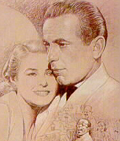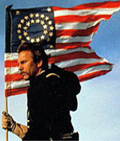|
Study Guide -
Unforgiven 1992
Director : Clint Eastwood
Stars :
Clint Eastwood .... William 'Bill' Munny
Gene Hackman .... Little Bill Daggett
Morgan Freeman .... Ned Logan
Richard Harris .... English Bob
Jaimz Woolvett .... The Schofield Kid
Saul Rubinek .... W.W. Beauchamp
Frances Fisher .... Strawberry Alice
Preparation :
Read the movie reviews by Roger Ebert, the New York Times Review and Filmsite.org
Historical/Social Significance :
"As in many Westerns, the narrative of Unforgiven begins with an injustice that must be put right. However, the law in this case is made explicitly patriarchal, serving only male interests, and avenging a conventional crime against a woman is initiated not by a male hero, but by an unconventional society of women."1
Gene Hackman was persuaded over his initial reservations to play the role of the sadistic sheriff, Little Bill, only after watching the infamous “Rodney King video”, and he even refers to the beating of Ned Logan as “[his] Rodney King scene”2
"Eastwood’s casting choice evokes this recent cathartic event, and its continuity with the long history of lynching and other forms of white violence against blacks in the United States. Freeman’s role also acknowledges the fact that perhaps 25% of cowboys were blacks who had migrated from the South before emancipation." (Goss)
Synopsis :
Will Munny, a notorious gunman had been reformed by his wife. He became a pig farmer and had a family. When his wife died and things started to go bad on the farm he was tempted out of retirement to go on one final job.
Guided Questions for Viewing :
Assessment questions will be based on the following :
-
Eastwood recognized that he “reached a stage in [his] life…”, but he also believed that as a society we had “reached a stage in our history where… violence shouldn’t be a source of humor or attraction” (Goss)
-
Do you feel that the women were morally justified in hiring assassins?
-
"The principal male protagonists in Unforgiven are imposters: William Munny is a cold-blooded mass murderer who mouths pious homilies learned from his dead wife; Schofield Kid names himself after his preferred model of the Smith and Wesson pistol and boasts that he is an experienced killer of men, but he has never fired his weapon in anger; English Bob is a cockney commoner who adopts airs of nobility; and Little Bill is a sadistic bully who imagines himself as citizen-settler and peacemaker. Other lies are exposed as the filmmakers relentlessly de-mythologize “the West”, exposing the frontier as a morally and socially complex place. If good and evil, and truth and falsehood, are confused, so we shall see, are ethnicity, class, and gender, and the identity of “America” itself."(Goss)
-
Who was the most heroic figure in the film for you? Use events from the film to back up your answer.
-
The process of myth making and myths becoming history is a very important focus of Unforguven. Comment on how this process is shown in the movie.
-
"When Munny finally turns to violence he is replaying not just his own 'legendary' past but also the glory days of Clint Eatwood's Western career .... In dramatizing Munny's inevitable emergence from disguise, Eastwood is thus showing us the essence of his own quasi-mythic character, in the very moment he seems to be renouncing it.3
-
"I sensed the deep satisfaction some audience members took when Munny blows away his enemies...suggesting that for many of us, the myth of redemptive violence has become so entrenched, and the pleasures expected of Eastwood's violent persona so firmly ingrained, that they conflict with and perhaps override our desire for Munny's redemption."4
Sources:
1. Lusted , David. The Western." 2003. p. 269
2. Goss, Jon. "Unforgiven and the Spirit of the Laws." http://jongoss.info/papers/unforgiven.htm
3. Blundell, Mary and Orman, Kirk. "Western Values, or, The Peoples Homer: Unforgiven as a Reading of the Iliad". Poetics Today vol. 18. p. 562
4. Plantinga, Carl. "Unforgiven and the uncertainties of the heroic", Canadian journal of film studies, vol. 3. no. 2 p. 58
Ebert, Roger. "Unforgiven". July 21, 2002. www.rogerebert.com
|



